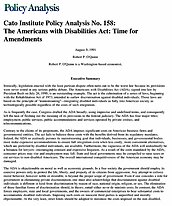As is frequently the case, Congress drafted the ADA broadly, using imprecise and undefined terms, and consequently left the task of fleshing out the meaning of its provisions to the federal judiciary. The ADA has four major titles: employment, public services, public accommodations and services operated by private entities, and telecommunications.
Contrary to the claims of its proponents, the ADA imposes significant costs on American business firms and governmental entities. The act fails to balance those costs with the benefits derived from its regulatory mandates. Indeed, the ADA so zealously pursues its mainstreaming goal that individuals, businesses, and governmental bodies must make expensive accommodations to ensure full integration even when less costly, more convenient alternatives, which are preferred by disabled individuals, are available. Furthermore, the vagueness of the ADA will undoubtedly be a bonanza for lawyers–encouraging constant and expensive litigation. As a result of the costs mandated by the ADA, consumer prices may rise and employment may fall. State and local governments may be compelled to raise taxes or cut services to non-disabled Americans. The overall international competitiveness of the American economy may be damaged.
The ADA is objectionable on moral as well as economic grounds. In a free society the government should employ its coercive powers only to protect the life, liberty, and property of its citizens from aggression. Any attempt to enforce moral behavior, however noble or desirable, is beyond the proper scope of government. Even if one concedes a role for government in eliminating private discrimination, one must also acknowledge that discrimination against disabled individuals is different in kind from discrimination by reason of race, national origin, religion, or sex. The elimination of those familiar forms of discrimination should, in theory, entail either no or de minimis costs. In contrast, the ADA forces employers, state and local governments, and the owners of commercial enterprises to bear substantial costs to accommodate disabled individuals. Imposing such costs on innocent third parties is unjustified and morally objectionable. At the very least, strict limits should be adopted to minimize the costs imposed on the non-disabled.
Moreover, when government uses its regulatory power not to prevent one person from harming others but instead to impose substantial costs on some people for the benefit of others, such regulations are takings. The government has a moral, if not a legal, obligation under the Fifth Amendment to the U.S. Constitution to compensate individuals and business firms for the costs of such regulations. Failing to provide such compensation, the ADA is confiscatory in nature and represents another congressional attempt to force American business to act as a social welfare and income redistribution agency.
Certain amendments to the ADA could significantly limit its costs while actually enhancing the act’s ability to integrate disabled people into American society. Costs that are not offset by tax credits or grants and that exceed certain minimal amounts should be presumed to be an “undue hardship” on employers or “not readily achievable” and an “undue burden” on the owners of public accommodations. For example, under certain conditions, paratransit services should be a legally acceptable alternative to retrofitting existing mass transit system vehicles and stations; telephone ratepayers should not be forced to subsidize specialized services for the hearing impaired; only a limited percentage of new multifamily housing should be required to be fully accessible; and expansion of existing state credits and grants to offset the costs of accommodations required under the ADA may be desirable.


